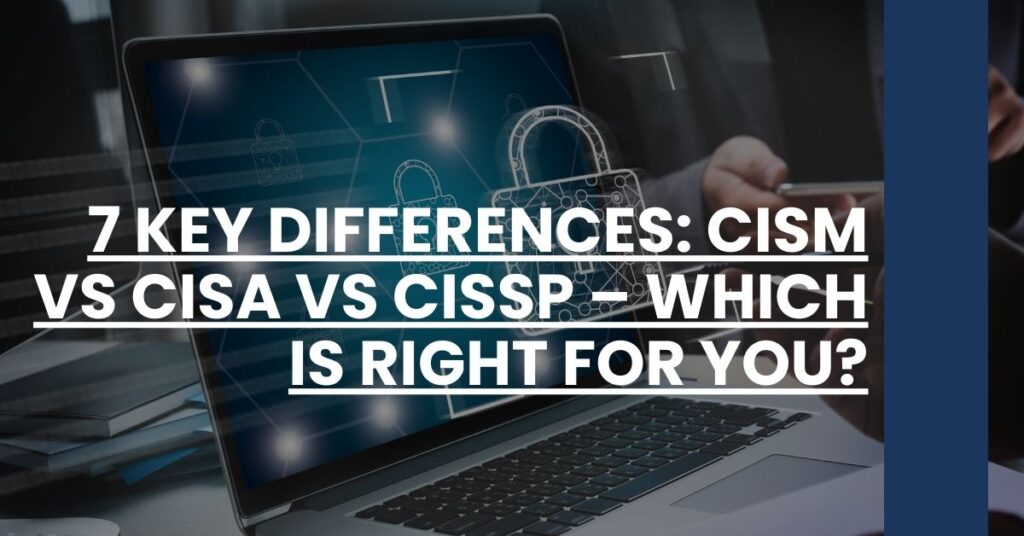Are you navigating the labyrinth of IT security certifications and torn between CISM, CISA, and CISSP?
Unlocking doors to career advancement often hinges on choosing the right key—certification.
Our article slices through the fog, laying out crisp insights to align your professional ambit with the most fitting credential.
With a spotlight on distinguishing factors such as career trajectory, core competencies, and financial incentives, this is your strategic overview to making an informed decision in the realm of IT security excellence.
1. Career Pathways and Job Roles
As you’re navigating the complex world of IT certifications, you might find yourself pondering the benefits of CISM vs. CISA vs. CISSP. To choose the path that’s best for you, it’s essential to understand how each certification fits into the larger career landscape.
- CISM (Certified Information Security Manager): This certification is a golden ticket for those aspiring to climb the ranks in information security management. With a CISM credential, you can aim for a myriad of roles such as Chief Information Security Officer, Information Risk Consultant, or IT Security Manager, embedding you into the decision-making core of your organization’s security strategy.
- CISA (Certified Information Systems Auditor): If you possess a knack for inspection and enjoy an investigatory approach towards systems and operations, CISA might be your perfect match. Audit control, assurance, and even cyber law are areas where a CISA certification can propel you to success. Positions like IT Auditor, Systems Analyst, and Compliance Officer showcase the audit-centric positions CISA holders often secure.
- CISSP (Certified Information Systems Security Professional): This globally recognized accolade caters to those with a deep-rooted passion for cybersecurity. With its comprehensive coverage of operational security and deeply technical aspects, roles such as Security Architect, Network Analyst, and even Security Systems Engineer await CISSP-certified professionals. The CISSP is a credential that places you on the frontlines of an organization’s cyber defense.
As you consider your future in IT security and management, reflect on which roles and responsibilities inspire you the most—this insight might just be the compass you need.
2. Core Focus and Knowledge Domains
Diving deeper into the world of CISM vs. CISA vs. CISSP certifications, each plays a crucial role in its area of expertise. Knowing the core focus and foundational knowledge of each can help you pick the certification that resonates with your career vision.
- CISM: This certification lays its cornerstone in strategic security management and governance. It’s tailored for those aiming to direct and oversee an enterprise’s information security, making sure all pieces of the security puzzle fit securely together.
- CISA: With a primary focus on auditing, control, and assurance, CISA firmly establishes its holders as masters of quality checks and regulatory compliance—a fit for those with an eagle eye for detail and a passion for maintaining checks and balances in complex IT systems.
- CISSP: Spanning a spectrum of eight comprehensive domains of information systems security, this certification plunges into the depths of security operations, risk management, and network architecture, ensuring a robust skillset. CISSP is your calling if you dream of designing and implementing formidable security frameworks.
By aligning your professional goals with these core domains, you’re not just choosing a certification; you’re defining the blueprint of your IT security career.
3. Prerequisites and Eligibility Requirements
As you weigh the options between CISM vs. CISA vs. CISSP, understanding what it takes to be eligible for each of these prestigious certifications is a vital step in planning your ascent.
- CISM: Gearing up for this certification requires at least five years of experience in information security, with three of those years being in a managerial capacity. A hefty investment in your career, but invaluable for those set on commanding security strategies.
- CISA: Similarly, CISA calls for five years of experience in systems auditing, control, or security. For those reaching for roles in organizational governance and accountability, the CISA prerequisite assures you’re seasoned enough to take the helm.
- CISSP: Here, you need a cumulative experience tally of five years in at least two of its eight domains. It’s designed to authenticate a broad-based expertise, setting a gold standard for security professionals.
Before taking a leap towards these certifications, ensure your experience aligns with their requirements—this solid foundation will not only qualify you for the exam but also fortify your standing in a competitive field.
4. Exam Content and Structure
The journey to becoming a certified professional in IT security includes a crucial step: passing a rigorous exam. The structure and content of these exams—whether for CISM, CISA, or CISSP—are tailored to their unique specialties and will test the breadth and depth of your knowledge.
- CISM: Expect a challenging 150 multiple-choice questions over a four-hour period, delving into the nitty-gritty of information security governance, risk management, and incident response—the hallmarks of a security leader.
- CISA: Its exam is a litmus test for your auditing expertise, with similar format and timing to CISM, it focuses on your ability to audit, control, and maintain an organization’s IT systems.
- CISSP: With its adaptive testing format and a time frame of up to six hours, the CISSP exam is both broad in scope and deep in detail, testing decision-making skills across diverse security domains to equip you for a highly technical cybersecurity environment.
Each certification’s exam presents a different challenge, a reflection of the distinct skills and knowledge required to excel in varied aspects of IT security.
5. Recognition and Accreditation
In the professional realm, the value of your certification is only as high as its recognition in the industry. When it comes to CISM vs. CISA vs. CISSP, each holds a prestigious position and is recognized globally as a testament to an individual’s expertise and commitment.
- CISM: Accredited by ISACA, the CISM certification is not just a badge—it’s a statement that you are well-versed in security governance and possess strategic insight necessary to protect organizations against modern threats.
- CISA: Also governed by ISACA, a CISA credential signals that you are among the elite in systems auditing, and it’s a trusted standard across industries for roles that require uncompromising rigor in IT system evaluation.
- CISSP: Administered by (ISC)², the CISSP certification speaks volumes about your all-encompassing knowledge and skills in cybersecurity, commanding respect and recognition across an array of IT security jobs.
These credentials don’t just elevate your career—they can also provide an assurance of excellence that’s recognized across the globe, echoing your proficiency in every corner of the tech industry.
6. Continuing Education and Maintenance
When you venture down the road of achieving a CISM, CISA, or CISSP certification, understand that it isn’t a one-time effort but rather a continuous journey of learning and professional development. Each governing body mandates ongoing education to ensure that your knowledge remains at the cutting edge of information security.
- CISM and CISA: For both of these ISACA certifications, you are required to engage in 20 hours of continuing professional education (CPE) annually, totaling 120 hours over a rolling three-year period. Not only does this fortify your present knowledge base, but it also ensures you’re current with the evolving landscape of IT security.
- CISSP: (ISC)² prescribes a more intensive 40 hours of CPE credits each year over the usual three-year cycle, reflecting the broad and deeply technical nature of the certification. This commitment signifies that CISSP professionals are continually refining their craft.
Remember, these are not just tick-box exercises—they’re resources that can help propel your career forward. By staying updated with the latest security trends, you safeguard not just your credential but also your relevance in an ever-changing industry.
7. Salary Expectations and ROI
Considered an investment in your future, CISM vs CISA vs CISSP certifications can yield significant dividends in terms of salary and career growth. The returns on these investments are more than just financial; they’re transformative for your career.
- CISM: If your trajectory leads you towards strategic, high-level managerial roles, the average salary for CISM-certified professionals stands at an impressive $131,209. It’s a testament to the strategic importance organizations place on qualified security management personnel.
- CISA: With an average salary of around $97,117, CISA certification not only balances your books but also reflects a dedication to excellence in systems auditing—a career that’s instrumental in maintaining the integrity of IT systems.
- CISSP: The gold standard of cybersecurity certifications, a CISSP, can expect to command an average of $125,470 annually, commensurate with its standing and the critical technical expertise required by its holders.
While these figures are impressive, remember that the true value of these certifications lies in the doors they open and the career heights they help you achieve.
Is Experience More Valuable than Certification?
In the world of IT security, debate often arises around the relative value of hands-on experience versus the seal of approval that comes with certification. In truth, your career progression is most powerful when it’s furnished with the right blend of both.
- Experience: On-the-job learning provides irreplaceable insights and practical knowledge; there’s no substitute for the lessons learned in the field.
- Certification: Conversely, certifications like CISM, CISA, and CISSP validate your expertise and often serve as a baseline requirement for advanced roles within organizations.
Ultimately, consider certifications as a ladder to higher positions, but recognize it’s experience that underpins your day-to-day excellence.
How CISM, CISA, and CISSP Complement Each Other
Your professional value may be multiplied by combining certifications, as each contributes unique knowledge and skills that can complement each other.
- Holistic Security Perspective: Holding a CISSP demonstrates breadth and depth in cybersecurity, which, when combined with CISM, can provide a 360-degree view of both tactical and strategic security leadership.
- Audit Proficiency and Security Oversight: Pairing CISA with either CISM or CISSP can enhance your credibility in audit and controls while also ensuring a firm grasp on security operations.
- Maximized Versatility: Employers often seek candidates who can consistently perform across various domains. These certifications collectively demonstrate a commitment to versatility and personal growth.
Tips for Choosing the Right Certification
Choosing the right certification can often seem daunting. Consider the following as you evaluate which certification—CISM, CISA, or CISSP—is aligned with your personal interests and the demands of the market.
- Assess Interests: Are you drawn to strategic management, operational protection, or control auditing? Align your interests with the certification’s core focus.
- Market Demand: Research which certifications are most sought after in your desired job market and consider how adding such credentials may impact your employability.
- Long-Term Goals: Each certification can set you on a specific career trajectory. Ponder where you see yourself in the next five to ten years and choose the credential that best aids in achieving those goals.
Conclusion: Making Your Decision
The choice between CISM, CISA, and CISSP is not just a crossroad—it’s a significant milestone in your IT security career. Each certification carries with it a weight of recognition, specialization, and potential career growth. Whether you’re gravitating towards managerial leadership, audit excellence, or comprehensive cybersecurity skills dictates the direction you should take.
With the variables of career objectives, job market trends, and personal interest at play, your decision should reflect an intersection of these factors—culminating in the selection of a certification that not only elevates your professional status but also aligns seamlessly with your vision for the future. Remember, this decision is more than an academic pursuit; it’s a strategic step towards redefining your role in the vast and dynamic sphere of IT security.

